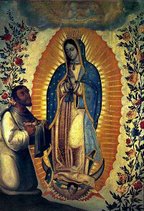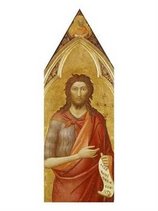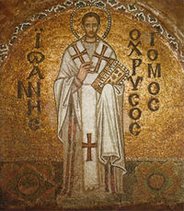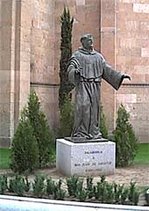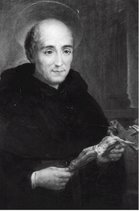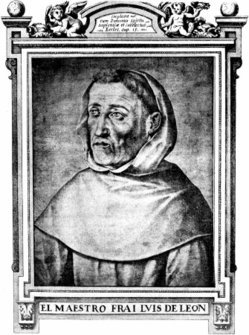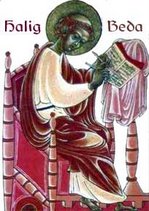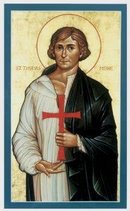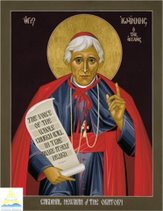Dutch Artist and Engineer- Theo Jansen
If course this is art facilitated by wind and Holland's crappy weather. It's genius though. Leonardo would have approved.
"Dilige et quod vis fac." -St. Augustine from the 7th Sermon on the First Letter of St. John.
Posted by
Antonio449
at
5:14 PM
0
comments
![]()
(Adapted from The Book of Belief and Opinions by Saadia Gaon, a 9th century Jewish Philosopher)
1. It's too hard to think about such things as whether there's a God or not. The truth is burdensome and bitter. And people want to live unconditionally with no boundaries or limits.
(i.e. .)
2. General ignorance about the subject coupled with sloppy thinking. This is a willed ignorance in that I never really took the time to investigate the subject but I had the time and the resources to do so.
3. Instant gratification and worldly distractions. (i.e. Just give me my money and my whores.)
4. Laziness. An indifference toward philosophical and religious speculation. "What do I get out of it? what does it do for me?" (i.e. It's all about me and my desires.)
5. Arrogance and conceit. A person may be so arrogant as to not consider that there might be something they don't know or a source of wisdom they are ignorant about. (i.e I am expert in this one tiny little area of human knowledge and so I can lecture you on religion even though I don't really know that I don't know what I'm talking about. Being as I am so darn smart as an expert and all.)
6. Arguments or vain words from unbelievers. Does one not consider that just as cold and heat can kill or even harm you if you do not protect yourself so to do poisonous ideas?
Of course it could be I was waiting for the right excuse to come along and then just rolled with it to liberate myself from God. A case in point: The Genesis creation story as Babylonian elements in it? Oh, well know the whole God thing is off.
You mean the Ancient Hebrews who lived along side tons of other cultures like the Egyptians, Babylonians, Assyrians, actually interacted with them? It couldn't be that these elements were substantially reworked and all. The sun and moon not being gods anymore? The cosmos no longer manufactured from a dead monster's carcass? There couldn't be something to that could there? Like an overarching monotheism. Hmmmm.
7. A weak or ridiculous argument put forward for belief in God that makes someone think this is the only possible approach to the subject. For example: It says it right here in the Bible that God exists so then it's so. (i.e. straw man arguments: I think everyone who believes in God is like the late Jerry Falwell or other caricatures of televangelists and fundamentalists)
8. Someone's hatred of certain monotheists via personal encounters or media manipulation (i.e. I have been trained to froth at the mouth at the very mention of the aforesaid late Jerry Falwell. Theocracy! Theocracy!) But this often leads someone to hate the God these people are proclaiming as well. Of course such eventful life positions should not be based on mere emotions but reason. So as much a "religious" person might have hurt me or called my wife a whore (a la Brother Jed) my hatred of God could end up being a far greater punishment for me than anything I could bring upon my enemies. You know I could end up in Gehenna- I mean Hell, because of said hatred.
Posted by
Antonio449
at
8:25 PM
0
comments
![]()
 From the Judean Times, 29 August 0031
From the Judean Times, 29 August 0031
THE DISAPPEARANCE of a controversial preacher styled “John the Baptist”, the leader of a fringe religious group, has become the focus of a scandal that could threaten the government of King Herod.
The “Baptist” has previously been censured by the Health and Safety Inspectorate for failing to undertake a risk assessment before immersing people in the cold water of the Jordan river as part of an exotic religious ritual. The Judean Social Services' Jordan Bank Area Committee have begun an investigation into the emotional abuse of his congregation on the grounds of his insistence on sin and guilt and his use of an overly didactic approach to adult learning in which he instructs people to “Behold” another religious figure as the “Lamb of God” rather than explore different possible lambs of God in small groups according to the personalised learning styles of his hearers. The Judean Health Education Council has issued a statement warning that his “locust and honey” diet is lacking in essential vitamins. They have urged people to focus instead on the avoidance of saturated fats and salt and the consumption of five portions of fruit and vegetables per day.
In the past few days, however, his dogmatic assertions have caused more serious questions to be asked at senior government level. “The Baptist” is reported to have told King Herod that his marriage to Herodias, his brother’s wife, was immoral. An aide to King Herod, Rupert Brownose, a leading member of the Judean Secularist Society commented that his remarks lacked Christian charity. “He is supposed to be a follower of Christ who, I understand, told us to love one another. It hardly seems loving to criticise a public figure for his choice of partner. John the Baptist is exhibiting arrogance and religious intolerance” the spokesman continued, “by presuming to pronounce on the individual conscience of the King.”
Unconfirmed reports suggest that “The Baptist” has recently expressed strong views on a recent event featuring the performance artist Salome, the daughter of the King’s partner by a previous relationship. The itinerant prophet referred to the cultural event as immodest and scandalous. Some of those attending the performance expressed outrage at his comments. Sir Herbert Syncretist-Rolltrouser said, “This so-called prophet's gratuitous insult to a sensitive piece of performance art is the mark of a philistine who has nothing better to do than attempt to impose his personal morality on others.” (Following complaints from Philistine community leaders, Rolltrouser later apologised, saying that his remarks had not been intended to offend any particular ethnic group.)
Since the Salome performance, the “Baptist” has not been seen. Some supporters have claimed that a headless corpse found in the basement of Herod’s Palace is that of their religious leader. They say that the King, besotted with Salome, offered her anything she chose; and that his partner had suggested that she ask for his head on a platter. Government sources have issued a strong denial, insisting that the Queen’s remark was made in jest and that no further action had been taken against the “Baptist.”
Posted by
Antonio449
at
6:19 PM
0
comments
![]()

"All right then, I'll say it. Dante makes me sick."
Lope de Vega (1635)
"Bien, entonces lo diré. Dante me pone enfermo"
Lope de Vega (1635).
Posted by
Antonio449
at
1:41 PM
0
comments
![]()
(From Wikipedia)
Baltasar Gracián y Morales (January 8, 1601 – December 6, 1658) was a Spanish Baroque prose writer. He was born in Belmonte, near Calatayud (Aragon).
The son of a doctor, in his childhood Gracián lived with his uncle, who was a priest. He studied at a Jesuit school in Zaragoza from 1616 to 1619 and at the age of 18 became a novice. He studied philosophy at the College of Calatayud in 1621 and 1623 and theology in Zaragoza. He was ordained in 1627 and took his final vows in 1635.
He assumed the vows of the Jesuits in 1633 and dedicated himself to teaching in various Jesuit schools. He spent time in Huesca, where he befriended the local scholar Vincencio Juan de Lastanosa, who helped him achieve an important milestone in his intellectual upbringing. He acquired fame as a preacher, although some of his oratorical displays, such as reading a letter sent from Hell from the pulpit, were frowned upon by his superiors. He was named Rector of the Jesuit college of Tarragona and wrote works proposing models for courtly conduct such as El héroe (The Hero), El político (The Politician), and El discreto (The Discreet One). During the Spanish war with Catalonia and France, he was chaplain of the army that liberated Lleida in 1646.
In 1651, he published the first part of the Criticón (Faultfinder) without the permission of his superiors, whom he disobeyed repeatedly. This attracted the Company's displeasure. Ignoring the reprimands, he published the third part of Criticón in 1657, and as a result was sanctioned and exiled to Graus. He tried to leave the order but was unsuccessful. He died in 1658 and is buried in Tarazona near Zaragoza in the province of Aragon.
Gracián is the most representative writer of the Spanish Baroque literary style known as Conceptismo (Conceptism), of which he was the most important theoretician; his Agudeza y arte de ingenio (Wit and the Art of Inventiveness) is at once a poetic, a rhetoric and an anthology of the conceptist style.
The three parts of the Criticón, published in 1651, 1653, and 1657, achieved fame in Europe, especially in the German-speaking countries. It is, without a doubt, the author's masterpiece and one of the great works of the Siglo de Oro. It is a lengthy allegorical novel with philosophical overtones. It recalls the Byzantine style of novel in its many vicissitudes and in the numerous adventures to which the characters are subjected, as well as the picaresque novel in its satirical take on society, as evidenced in the long pilgrimage undertaken by the main characters, Critilo, the "critical man" who personifies disillusionment, and Andrenio, the "natural man" who represents innocence and primitive impulses. The author constantly exhibits a perspectivist technique that unfolds according to the criteria or points of view of both characters, but in an antithetical rather than plural way as in Miguel de Cervantes. The novel reveals a philosophy, pessimism, with which one of his best readers and admirers, the 19th century German philosopher Arthur Schopenhauer, identified.
The following is a summary of the Criticón, reduced almost to the point of a sketch, of a complex work that demands detailed study.
Critilo, man of the world, is shipwrecked on the coast of the island of Santa Elena, where he meets Andrenio, the natural man, who has grown up completely ignorant of civilization. Together they undertake a long voyage to the Isle of Immortality, travelling the long and prickly road of life. In the first part, "En la primavera de la niñez" ("In the Spring of Youth"), they join the royal court, where they suffer all manner of disappointments; in the second part, "En el otoño de la varonil edad" ("In the Autumn of the Age of Manliness"), they pass through Aragon, where they visit the house of Salastano (an anagram of the name of Gracián's friend Lastanosa), and travel to France, which the author calls the "wasteland of Hipocrinda", populated entirely by hypocrites and dunces, ending with a visit to a house of lunatics. In the third part, "En el invierno de la vejez" ("In the Winter of Old Age"), they arrive in Rome, where they encounter an academy where they meet the most inventive of men, arriving finally at the Isle of Immortality.
Posted by
Antonio449
at
8:08 AM
0
comments
![]()
Enrique Santos Discepolo (1931)
You suffer now because
A hope for tomorrow takes me away
Which I’m earnestly seeking only because you.
A necklace made of stars
That coldly come apart
Are your fair eyes
Crying at me like that.
A dream of youth
That dies in your farewell
A timid memory that I long for
A song of hope that I strove for.
Caressing your soul with my solitude.
My poor heart doesn’t know what to think
And seeing them take you away
All it knows what to do is cry and sigh,
Bleeding as it dies in your farewell.
Lyrical first love
caresses and tortures
Sweetness and pain
In my awakening.
So I’ll hide away
Your great tenderness in a corner.
And look in my heaven
For your face from long ago.
Sufres porque me aleja
la fe de un mañana
que busco afanoso
tan sólo por ti.
Y es un collar de estrellas
que tibio desgranan
tus ojos hermosos
llorándome así.
Sueño de juventud
que muere en tu adiós,
tímida remembranza
que añoraré,
canto de una esperanza
que ambicioné
acariciando tu alma
en mi soledad.
Mi pobre corazón
no sabe pensar,
y al ver que lo alejan de ti
sólo sabe llorar,
sólo sabe gemir,
sangrando al morir
en tu adiós...
Lírico amor primero,
caricia y tortura,
castigo y dulzura
de mi amanecer.
Yo acunaré en un canto
tu inmensa ternura
buscando en mi cielo
tu imagen de ayer.
Posted by
Antonio449
at
4:47 AM
0
comments
![]()
 Enrique Santos Discepolo (1901-1951)
Enrique Santos Discepolo (1901-1951)
This tango is an attempt to describe the 20th century and how incredibly messed up it all was.
El cambalache- The bazaar (1939)
That the world was and will be full of filth,
I already know...
In the year five hundred and six
and in the year two thousand as well!
There always have been thieves,
traitors and victims of fraud,
happy and bitter people,
valuables and cheap imitations
But, that the twentieth century
is a display
of insolent malice,
nobody can deny it anymore.
We all lived sunk in a quagmire
and covered in the same mud.
Today it happens that to be a decent man or a traitor
is the same thing!
To be an ignoramus, a genius, a pickpocket,
a generous person or a swindler!
It’s all the same! Nothing’s better than another!
They’re all the same, an idiot ass
or a great professor!
There are no failing grades or merit valuations,
the immoral ones have caught up with us.
If one lives as an imposter
and another, in his ambition, steals,
it's the same if it's a priest,
a mattress maker, a king of clubs,
a cad or a tramp.
What a lack of respect,
what a way to trample reason!
Everyone’ s a gentleman!
Everyone’s a thief!
Mixed with Stavinsky, you have Don Bosco
and La Mignon
don Chicho and Napoleon,
Carnera and San Martin.
Like in the disrespectful window
of the bazaars,
life is all mixed up,
and wounded by a sword without rivets
you can see a Bible crying
next to a water heater.
Twentieth century, bazaar
problematic and feverish!
If you don't cry you don't get fed
and if you don't steal you're stupid.
Come on! Go ahead!
Then we'll reunite in hell.
Don't think anymore,
move out of the way.
Nobody seems to care
if you were born honest.
Because it's the same for the one who works,
day and night like a dog,
as it is for someone who lives off other people,
kills, or heals
or lives outside the law.
Que el mundo fue y será una porquería,
ya lo sé . . . .
En el quinientos seis
y en el dos mil también!
Que siempre ha habido chorros,
maquiavelos y estafaos,
contentos y amargaos,
valores y dublés...
Pero que el siglo veinte
es un despliegue
de maldad insolente
ya no hay quien lo niegue.
Vivimos revolcaos en un merengue
y en un mismo lodo
todos manoseaos...
Hoy resulta que es lo mismo
ser derecho que traidor..!
Ignorante, sabio, chorro,
generoso o estafador!
Todo es igual! Nada es mejor!
Lo mismo un burro
que un gran profesor!
No hay aplazaos ni escalafón,
los inmorales nos han igualao.
Si uno vive en la impostura
y otro roba en su ambición,
da lo mismo que sea cura,
colchonero, rey de bastos,
caradura o polizón...
Que falta de respeto,
que atropello a la razón!
Cualquiera es un señor!
Cualquiera es un ladron!
Mezclao con Stavisky va Don Bosco
y "La Mignon,"
Don Chicho y Napoleon,
Carnera y San Martín...
Igual que en la vidriera irrespetuosa
de los cambalaches
se ha mezclao la vida
y herida por un sable sin remache
ves llorar la Biblia
contra un calefón.
Posted by
Antonio449
at
3:30 PM
0
comments
![]()

Ramon Llull wrote treatises in Latin, Arabic, and his mother tongue Catalan. The vernacular works are written to be more accessible and therefore works such as El llibre de meravelles and D'Evast e Blanquerna lay out an entertaining introduction to the Medieval Scholastic point of view of man, God, and the Universe. As well as questions of Reason, Faith, and Philosophy. I forgot how entertaining these works were since I had left them at home. I don't really read a lot of Catalan, especially medieval Catalan. But it is well worth the effort since the narrative form of such works makes abstract concepts and ideas eminently understandable, revealing another side of the Middle Ages that few have seen before.
English Translation:
The Book of Wonders by Ramon Llull. Book the First: On God, VII.On the Apostles
In the times of the prophets it was enough that a man convert people by belief since they already half-heartedly believed. And in the time of Christ and the Apostles miracles were needed, since people were not well versed in the written word, therefore they loved miracles which are demonstrations involving things visible to the body. But nowadays we have arrived at a time where people are in love with necessary reason, since they are awash in great branches of knowledge: such as philosophy and theology. Therefore we must overcome people who after studying philosophy fall into error against the Holy Roman Faith by employing necessary reason, and then destroy their false opinions with the same, using arguments taken from philosophy or theology.
En lo temps dels profetes es convenia que per creença hom convertís les gents, car lleugerament creien; e en lo temps de Crist e dels apòstols se convenien miracles, car les gents no eren molt fundades en escriptures, e per aço amaven miracles, qui són demostracions de coses visibles corporalment. Ara som esdevenguts en temps que les gents amen raons necessàries, car són fundades en grans ciències de fisolofia e de teologia; e per aço les gents que ab fisolofia son caiguts en error contra la santa fe romana, cové conquerir ab raons necessàries, e destruir a ells llurs falses opinions ab raons necessàries, les quals raons sien per fisolofia e per teologia.
Posted by
Antonio449
at
4:54 PM
0
comments
![]()

Ramon Llull (1232[1] – June 29, 1315) (Pronounced /yoo-y(ə)/ (sometimes Raymond Lully or in Latin Raimundus or Raymundus Lullus, or in Spanish Raimundo Lulio) was a Majorcan writer and philosopher born into a wealthy family in Palma, Majorca, in the Balearic Islands, then part of the Crown of Aragon, now part of Spain. He wrote the first major work of Catalan language literature. Recently surfaced manuscripts show him to have anticipated by several centuries prominent work on elections theory. He is sometimes considered a pioneer of computation theory, especially given his influence on Leibniz.
Llull was well educated, and became the tutor of James II of Aragon. He wrote in Latin, Catalan, Occitan and Arabic. In 1265 he had a religious epiphany, and became a tertiary Franciscan. His first major work Art Abreujada d 'Atrobar Veritat (The Art of Finding Truth) was written in Catalan and then translated into Latin. He wrote treatises on alchemy and botany, Ars Magna, and Llibre de meravelles. He wrote the romantic novel Blanquerna, the first major work of literature written in Catalan, and perhaps the first European novel. Llull pressed for the study of Arabic and other then-insufficiently studied languages in Spain for the purpose of converting Muslims to Christianity.
Schopenhauer described Llull's conversion, as recorded in Johann Jakob Brucker's Critical History of Philosophy, Book IV, Part I, page 10. "Hence men who have led a very adventurous life under the pressure of passions, men such as kings, heroes, or adventurers, have often been seen suddenly to change, resort to resignation and penance, and become hermits and monks. To this class belong all genuine accounts of conversion, for instance, that of Raymond Lull, who had long wooed a beautiful woman, was at last admitted to her chamber, and was looking forward to the fulfillment of all his desires, when, opening her dress, she showed him her bosom terribly eaten away with cancer. From that moment, as if he had looked into hell, he was converted; leaving the court of the King of Majorca, he went into the wilderness to do penance." (The World as Will and Representation, Vol. I, § 68)
En tristícia e en llanguiment estava un home en estranya terra. Fortment se meravellava de les gents de aquest món, com tan poc coneixien e amavan Déu, qui aquest món ha creat e donat als hòmens en gran noblea e bonea, per tal que per ells fos molt amat e conegut. Aquest home plora e planyia com Deus en est món ha tan pocs amadors e servidors e lloadors. E per ço que sia conegut, amat e servit, fa aquest Llibre de meravelles, lo qual departeix en deu parts, ço és a saber: Déu, Àngels, Cel, Elements, Plantes, Metalls, Bèsties, Home, Paradís, Infern. Aquest hom havia un fill que molt amava qui havia nom Felix, al qual dix aqueste paraules: Amable fill quaix mort és saviesa, caretat e devoció e pocs són los homens qui són en la fi a la qual Nostre Senyor Deus los ha creats. No es la fervor ne la devoció que ésser solia en lo temps del apostols e del martirs, que per conéixer e amar Déu llanguien e morien. A maravellar te convé on és caritat e devoció anada: vé per lo món, e maravelle't del hòmens perque cessan a amar e conéixer e a lloar Déu. Tota ta vida sia en Déu a amar e conéixer e plora per los falliments qui Deus ignoren e desamen.
Posted by
Antonio449
at
3:35 AM
0
comments
![]()
On the Names of Christ: Book 1
Dedication to Don Pedro Portocarrero of His Majesty’s Council
and the Holy and General Inquisition.
The calamities of our times are many and numerous, and not the least of which, Illustrious Sir, is that men have come to a state whereby what once was a medicine and a cure has become a poison which is also a clear indication that the end is near, and that death is at hand, for these signs are found in the midst of life.
It’s a case worthy of note that what we call Sacred Scriptures were inspired by God through the prophets who wrote them as a consolation in the travails of this life and a clear, faithful light in its darkness and error that we should have a suitable cure for the wounds that passion and sin cause in our souls. And since He wrote them for this purpose which is universal it is also manifest that He intended that their use should be common to all and thus He did his part because he composed them with simple words in a language that was the common tongue for the ones to whom it was first given.
Afterwards when these men along with the true knowledge of Jesus Christ this treasure was communicated and passed on to the gentiles, He made sure that they were translated into many languages and in almost all of those which were more widely known and held common so that they could be enjoyed commonly by all. Thus in the very beginning of the Church and not many years afterwards it was a great fault if each one of the faithful did not occupy themselves with the reading and study of the Divine books. For this reason the ecclesiastics and the so-called secular orders as well as the learned and the unlettered dealt so much with this knowledge, that the care the zeal of the common people aroused the study of those who are teachers by profession, I mean, the prelates and bishops, those who ordinarily declared the Holy Scriptures to the people at church, therefore the particular reading that one had at home enlightened with the light of that public doctrine as if taken up in the teacher’s voice but without error and was the cause of great advantage. Which was as good as the government and the fruit responded to that which was sowed as those who have some acquaintance with the history of those times know.
But as I was saying this thing which is so good in itself, and was so useful at that time is an occasion for much danger as our sad times and the experience of our great misfortune teach us. Thus those who govern the Church have placed a certain and duly measure in this business ordering that the Sacred Scripture not circulate in vulgar languages so that the common people could read them. And so that like rude animal-like people that either are not familiar with these riches or if they do they do not make good use of them, they have taken them out of the common people’s hands.
If one may marvel and in truth it its something to marvel at that among a people of the same religion it should happen that something which was once of great advantage to them has become something dangerous and mainly in things of such importance that if he were to look in to the origin of evil getting to know its sources I would say at least to my mind that the causes are twofold: ignorance and pride, pride more so than ignorance. The Christian people have fallen little by little into these evils from their primitive virtue.
Ignorance has been on the side of those whose business is knowledge and declaring these books and pride on the side of the same and everyone else though in a different manner for in these pride, honor, and presumption and the title of professors which they presumed about without deserving it blinded their eyes that they neither noticed their own faults nor did they become convinced that it would be well for them to take care to study and learn what they did not know or promised to find and this same attitude not only affected the latter by taking away their will to be instructed in such literature and books but they became convinced that they too could know and understand for themselves. Thus the people thought themselves masters and the former not being able to be what they were or should be, light became darkness so that among the people reading the Scriptures became an occasion for conceiving many very pernicious errors that were bubbling up and being discovered at ever hour.
But as the church prelates could take the Scriptures from the unlearned they could also place and set them at the attention, desire and understanding of those that are to teach them, this misery would not have to be cried over as much. These ones being like the heavens, rich and full of the virtue of this treasure, a great good could be derived for the lesser which are the soil on which they have influence. But for many this is in reverse in that they not only do not know the Books they either despise them or they do not seem to show much appreciation for those who are familiar with them. And bloated and content with a little taste of certain propositions they have the title of professors and theologians and they do not have any of the Theology. The beginning of which are the propositions of the Scholastics and the nourishment of doctrine which the saints write about and the height and perfection of which are the Sacred Letters to whose understanding everything before is ordered as a necessary end.
Yet leaving these and taking up the subject of the common people this damage by which they became useless for the reading of Scripture another, I do not know if a worse one, has followed: they have given free reign over to the reading of thousands of books which are not only worthless but definitely damaging which have grown in our age more than any other as by the art of the devil as well as the lack of good books. And it has happen to us like the earth which when it does not produce wheat it gives way to thorns. It would say that this second danger is greater than the first, for in the former men lose a greater instrument to be good in the latter but in the former it makes them apt for evil, there the control of virtue is loosen, here vice is egged on. For if as Saint Paul alleges bad conversations corrupt good manners what won’t a harmful book do that converses with who reads it all the time and at every hour or how could someone who nourishes themselves off of weeds and poison not end up with a vicious and evil demeanor?
Truly if we wish to look into it with attention and be just judges we cannot but find that a great part of the backsliding and perdition that is found continually in our manners comes from these disconcerting, books. And the zealous for God find in them a flavor of paganism and faithlessness- that I do not know if in any age of the Christian people has been felt as strong- in my judgment the source and cause of it all are such books. It is a case for great compassion that many simple pure people are lost in this before being warned about it, and without knowing how or why they find themselves poisoned and they dash themselves on this hidden bolder. Since many of these writings usually circulate among young damsels and girls and their parents do not pay it any mind for which all the rest of the candor they have comes to not.
Therefore since the writing of sound doctrine has always been beneficial which awaken souls and lead them towards virtue in this time it is so necessary in my judgment that all those in whom God has placed for such a task have the obligation of busying themselves with it, writing in our language for common use some things which are either inspired by the Sacred Scriptures, close to or dealing with the same material so that they supplement them with the common task of mankind and that they take away the vain and dangerous books, replacing then with the more salutary books.
Although it is true that some learned and very pious people have happily worked on many such writings, full of usefulness and purity, but nowise should others who can occupy themselves in these efforts feel not obliged to do so nor for this reason alone should they put pen to paper for if all who could write wrote, all of it would be much less not only of what one can write on such matters but of that which, according to our necessity, should be written because man’s tastes and inclinations are so different as the evil writings are already so many and well-received at which the good writings are directed. As in war strongholds are laid siege and surrounded, attacked on all sides, with all the engines that the military discipline teaches us. It is necessary that this same thing be done by the good and learned minds of the times without one being careless (with another) in a bad use so towering and fortified as this one which we are talking about.
Thus I judge it and have always done so. And even I know myself to be the least among all those who can serve the Church on this matter I am talking about, I have always desired to serve in said capacity and I could, and on account of my bad health and many I have not done it until now.
But since my past busy and troubled life was an obstacle for me putting my desire and wisdom into action it does not appear that I should lose the occasion of this leisure which the injury and ill will of some people has placed me. Because though the travails that surround me are many but the long favor of heaven that God, the true father of the oppressed, gives me without deserving it, and the witness of conscience in the middle of the all have calmed my soul with such peace that not only in the amendment of my habits but also in the business and knowledge of truth. I now see and can do what I could not before. And the Lord has converted this travail into my light and health and through the hands of those who tried to do me wrong he has produced my good. To whose excellent and divine mercy I would not respond in the least with the corresponding gratefulness if that now that I am able, in the way that I can according to the weakness of my fancy and strength I did not put thought into this that to my judgment is so necessary for the good of his faithful.
For this purpose some conversations came to mind which in the past years three friends of mine from my Order, two of them men of great letters and mind, had amongst each other on a certain occasion about the names by which Jesus Christ is referred to in the Sacred Scriptures. Which one of them referred to me afterwards and because of their quality I could not forget them.
Wishing now to write something that was useful to Christ’s people it seemed to me that beginning by his names as a starting point is the most felicitous and best. And for the usefulness to the reader, the most advantageous and for my mind the sweetest material and most pleasing of all since Christ Our Lord is like a spring or better yet an ocean that comprehends in itself all the useful and the sweet that is distributed among men. Thus speaking about Him, as if to say unwrapping this treasure is the sweetest and most precious knowledge. And by the order of right reason this knowledge is placed before the rest of treatises and sciences. This wisdom since it is the foundation of all these and it is the target which the Christian directs all his thoughts and deeds and thus the first thing we should find a place for in our soul is for his desire and for the same reason his wisdom with which this desire is born, flames up and grows.
And the true and proper wisdom of man is to know much of Christ and in truth it is the highest and most divine wisdom of all because understanding Him is understanding all the treasures of God’s wisdom that as Saint Paul says: “are enclosed in Him” and it is to understand the infinite love that God has for men and the majesty of his grandeur and the abyss of his counsels without end and the invincible strength of his immense power with the rest of the greatness and perfection that dwell in God and are discovered and shine more than in any other part in the mystery of Christ. These perfections or a great part of them can be understood if we understood the force and meaning of the names that the Holy Spirit gives him in Sacred Scripture because these names are like small figures in which God has miraculously enclosed all that the human understanding can and should comprehend about Him.
For having put in writing afterwards what was spoken then as I review my memory, in almost the same way as it was told to me and as close as possible to the true events or their resemblance, I now send it to you Your Grace to whose service all my works are directed.
-Fray Luis de León
Posted by
Antonio449
at
11:05 PM
0
comments
![]()
Portuguese song:
Bate o pé, bate o pé, bate o pé, faça assim como eu.
Bate o pé, bate o pé, bate o pé, foi assim como a minha amor me prendeu.
Posted by
Antonio449
at
10:53 AM
0
comments
![]()
Posted by
Antonio449
at
11:18 PM
0
comments
![]()
Near a decade ago during the Miami epoch. So called due to the fragments of chunky shoes and beer bottles found at a certain strata of the geological record there existed a website founded on lies which Dave (no relation) a student at said Miami University who didst post such lies on his door. One of them an elaborate yarn spun by an individual, Jeff Morrow by name, whose tires inexplicably burst whilst braving the wilds of Hamilton Ohio all in order to miss a university lecture. This website is remarkably still in existence. An amazement given the distance of the Miami epoch and the demise of Attractions and First Run.
Dave's Big Web of Lies.
Now, if one were to search under a random word say parsley, one gets a string of phrases which are utterly untrue:
Source: Steven Grady (grady@xcf.berkeley.edu) | Obligatory Self-reference |
Source: tbob7@webtv.net | Obligatory Self-reference |
Source: Dust to DustSubmitted on Monday the 8th of November 2004 | Obligatory Self-reference |
Source: Paul Wayper (paulway@mabula.net) | Obligatory Self-reference |
Source: Paul Wayper (paulway@mabula.net) | Obligatory Self-reference |
Source: Joshua Belsky (jjbelsky@yahoo.com)Submitted on Monday the 5th of April 2004 | Obligatory Self-reference |
Source: Shane-Christopher Desmond (fitzroy@geocities.com)And now for the topper: Journalism is an honourable profession, attracting some of the most talented and thoughtful minds in the world. Its aim is to inform, elucidate and uplift the human spirit.
Or if you prefer: William Shakespeare's middle name was Colin.
| Obligatory Self-reference |
Posted by
Antonio449
at
8:06 PM
0
comments
![]()
I.álgido
álgido from Latin algĭdus, means "very cold" referring to temperature and medical conditions such as a feverish chill. However another meaning has to do with a critical or decisive moment that occurs in political or social institutions.
“marca el punto álgido de la influencia institucional de España en la UE”
DRAE álgido, da.
(Del lat. algĭdus).
1. adj. Muy frío.
2. adj. Med. Acompañado de frío glacial. Fiebre álgida. Período álgido del cólera morbo.
3. adj. Se dice del momento o período crítico o culminante de algunos procesos orgánicos, físicos, políticos, sociales, etc.
II. ilusión.
1. f. Concepto, imagen o representación sin verdadera realidad, sugeridos por la imaginación o causados por engaño de los sentidos.
2. f. Esperanza cuyo cumplimiento parece especialmente atractivo.
3. f. Viva complacencia en una persona, una cosa, una tarea, etc.
Posted by
Antonio449
at
8:41 AM
0
comments
![]()

(1526-1591)
In a banquet with friars one of them commented: "This is good wine" And someone else responded: "Well if He came then why didn't they accept him?" To which Fray Luis replied: "Whenever He comes we are obliged to believe it even though there is doubt and His coming be uncertain."
(In Spanish "vino" means- wine or he came)
Three versions given by witnesses at the Trial:
En un convite con otras personas, diciendo uno dellos vino, ‘cuando viniere obligados somos a creerle, aunque se dubda , o hay dubda si es venido.
Había el uno dellos dicho vino, y el dicho Fray Luis había respondido: Cuando viniere, obligados somos a creerle; aunque se dubda, o hay dubda si es venido.
Bueno vino es este; y había respondido otro: pues si vino ¿por qué no lo recibieron? Y el dicho Fray Luis de León dijo : que sea venido, forzadamente lo hemos de creer, y nos complelen a ello, aunque harta dubda hay
Posted by
Antonio449
at
11:16 PM
0
comments
![]()
